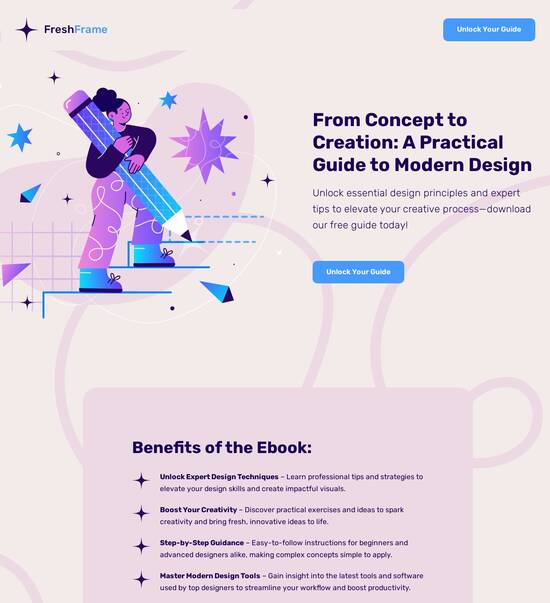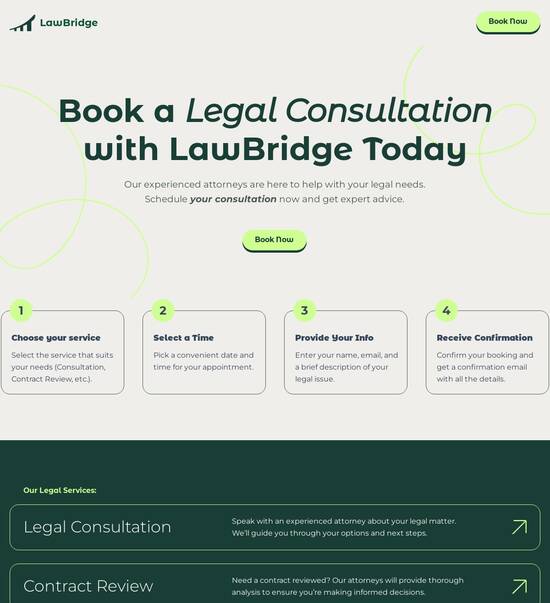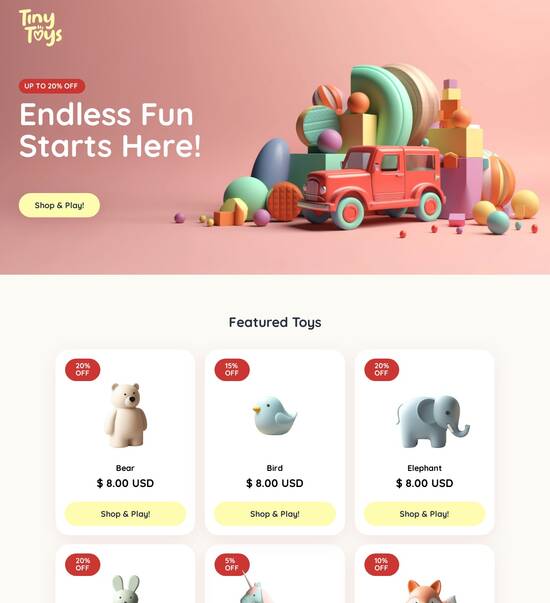
HTML/CSS optimized press release page template
Explore Similar TemplatesAbout template
Supercharge your press release page with HTML/CSS for outstanding performance! Learn more today.
Recommended templates

Easy to build without coding
With the intuitive drag-and-drop builder, anyone on your team can create high-converting pages without any knowledge of code or design. Make enhancements to your landing page with custom widgets using Javascript, HTML/CSS, or third-party scripts.

Multiple layouts for any industry and goal
Select from 500+ landing page layouts built to boost conversions across industry-specific scenarios. Customize them by adjusting fonts, adding images, and generating on-brand content with the AI assistant. Quickly scale with Instablocks® and Global Blocks that you can save, reuse, and update globally.

Loads fast and looks polished on any device
Every template is responsive, which means they present professionally on any device and load blazingly fast with our Thor Render Engine. You can also power them up with Google AMP technology to deliver an unparalleled mobile experience and drive higher conversions.

Robust analytics & experimentation
Get real-time updates and reporting across all your devices, showing the number of visitors, conversions, cost-per-visitor, and cost-per-lead. Launch AI-powered experiments, run A/B tests, and use heatmaps to analyze user behavior, then optimize your landing page to maximize conversions.







Easy to build without coding
With the intuitive drag-and-drop builder, anyone on your team can create high-converting pages without any knowledge of code or design. Make enhancements to your landing page with custom widgets using Javascript, HTML/CSS, or third-party scripts.
Multiple layouts for any industry and goal
Select from 500+ landing page layouts built to boost conversions across industry-specific scenarios. Customize them by adjusting fonts, adding images, and generating on-brand content with the AI assistant. Quickly scale with Instablocks® and Global Blocks that you can save, reuse, and update globally.
Loads fast and looks polished on any device
Every template is responsive, which means they present professionally on any device and load blazingly fast with our Thor Render Engine.
Robust analytics & experimentation
Get real-time updates and reporting across all your devices, showing the number of visitors, conversions, cost-per-visitor, and cost-per-lead. Launch AI-powered experiments, run A/B tests, and use heatmaps to analyze user behavior, then optimize your landing page to maximize conversions.
All the features you need to build lead-generating landing pages
Explore more featuresLearn how to build top-performing landing pages for any goal
FAQs
Leading the way in building high-performing landing pages





Maximizing ROI with Instapage: The Ultimate Landing Page and CRO Platform
Instapage stands out as the most powerful landing page and conversion rate optimization (CRO) platform, tailored to help marketers in diverse sectors enhance their digital campaigns. This guide will provide you with step-by-step insights on leveraging Instapage to not only create stunning landing pages but also optimize them for increased conversions and return on investment (ROI).
Why Choose Instapage for Landing Page Creation?
Instapage empowers your team with over 100 high-converting templates designed for various industries including Business Services, Education, and Financial Services. Whether you're a seasoned marketer or just starting, Instapage simplifies the landing page creation process. With features like real-time collaboration and intuitive builders, you can deploy pages without requiring extensive technical expertise or resources.
- Easy Template Customization: Modify existing templates to suit your branding and message.
- Drag-and-Drop Functionality: Quickly position elements on your page with effortless drag-and-drop tools.
- Built-in Lead Generation Tools: Utilize pre-built lead gen elements to enhance your lead capture rate.
Step 1: Craft Engaging Landing Pages
Creating high-impact landing pages starts with understanding your audience's needs. Design your pages for user experience and ensure responsive layouts across devices. Use the insights from heatmaps to track user interactions to inform your design choices.
Step 2: Optimize for Higher Conversions
After launching your pages, the next step is optimization. Implement A/B testing to refine your content, layout, and call-to-action buttons to identify what resonates best with your audience.
- Utilize A/B Testing: Experiment with different headlines and designs to find top performers.
- Analyze Heatmaps: Understand where users click and adjust your layout accordingly.
- Performance Metrics: Use the analytics dashboard to gauge campaign effectiveness.
Step 3: Personalize User Experiences
Harness the power of personalization in your marketing strategy by delivering tailored content to specific customer segments. Use dynamic text replacement and AdMaps to create a seamless user journey that aligns with their interests and previous interactions.
- Dynamic Text Replacement: Automatically change text based on the user's context or source.
- Specific Ad Targeting: Align ads to custom landing pages for targeted campaigns.
- Audience-level Metrics: Track performance and engagement metrics specific to different audience segments.
By employing Instapage effectively, marketers can navigate the complexities of digital marketing campaigns with ease. Its advanced tools and user-centric features are designed to meet a range of needs, granting you the flexibility to adapt based on results.
Take the first step towards enhancing your digital campaigns with Instapage today. Sign up for a free trial and discover how our all-in-one solution can revolutionize your approach to landing page optimization.
HTML/CSS Optimized Press Release Page Template: A Comprehensive Guide
The evolution of press release page templates in modern web design
Press releases have undergone significant transformations in their design and dissemination over the years. With the shift from print to digital platforms, press release pages now serve as essential tools for brands aiming to maintain relevance in a fast-paced, information-driven environment. These pages are no longer mere documents announcing news; they are dynamic web pages that leverage modern HTML and CSS technologies to create engaging user experiences. As brands increasingly focus on enhancing visibility and fostering credibility, the need for optimized press release templates has become paramount.
Moreover, today's digital landscape necessitates a fresh approach to press releases. Companies must adapt their messaging and how they present information to capture audience attention. A well-designed press release page not only conveys the message but also aligns with branding efforts and marketing strategies. As we explore this topic, we will uncover essential components that make a press release page effective and how HTML/CSS plays a crucial role in these developments.
The importance of press releases in digital marketing
Press releases are a cornerstone of digital marketing, functioning as authoritative announcements that inform the public and media about significant company developments. They create a sense of urgency, prompting journalists and bloggers to cover stories that can drive traffic, increase brand awareness, and build credibility. An effective press release can significantly impact a company’s digital presence, making it a crucial element of any comprehensive marketing strategy.
As brands navigate the digital space, the adaptability of press releases to various channels becomes essential. With the rise of online distribution platforms, a well-structured press release can quickly reach targeted audiences across multiple digital channels. This digital transformation ultimately enhances the effectiveness of press release campaigns, allowing for broader outreach and elevated engagement levels.
Establishing brand credibility by conveying professionalism.
Facilitating media coverage and enhancing relationships with journalists.
Driving traffic to the company’s website or social media platforms.
Improving search engine rankings through media distribution.
Understanding HTML/CSS as the backbone of web design
HTML and CSS are fundamental languages that power every web page. HTML (HyperText Markup Language) provides the structure of a web page, including elements such as headings, paragraphs, links, and images. Its role is to define what content is presented and how it is organized on the page, enabling search engines to understand the context of the information. Without a solid HTML foundation, even the most visually stunning web pages can become ineffective.
CSS (Cascading Style Sheets), on the other hand, is used to style and format the HTML content. It adds the aesthetic component, significantly enhancing the readability and appeal of a press release page. From fonts and colors to spacing and layout adjustments, CSS allows for a tailored experience that aligns with a brand's identity. Understanding both HTML and CSS as interdependent components is crucial for marketers who wish to create visually appealing and practical press release pages.
Key features of an optimized press release page template
When designing an optimized press release page template, there are several key features that significantly enhance both user experience and functionality. One of the most crucial aspects is responsive design, which ensures the page is accessible and visually appealing on all devices, including smartphones, tablets, and desktops. Given that a significant portion of web traffic comes from mobile devices, prioritizing mobile optimization is vital.
Furthermore, incorporating SEO best practices within press release templates enhances visibility in search engine results. This involves the strategic placement of keywords and metadata to help search engines index the content effectively. To optimize user experience, page load speed is another critical factor, as slow-loading pages can lead to high bounce rates. Techniques such as image optimization and minifying code are essential to ensure the press release page performs effectively.
Responsive design to ensure compatibility with various devices.
SEO integration including proper markup and tagging.
Fast loading times through optimized images and code.
Innovative template features for expert marketers
Marketers seeking to create standout press release pages should focus on customization options. A flexible template allows users to select colors, fonts, and layouts that resonate with their branding. Utilizing modular sections facilitates easy adjustments, enabling marketers to tailor each press release according to specific campaigns or announcements. This ability to customize enhances the effectiveness of the press release in terms of engagement and overall appeal.
Additionally, integrating various marketing tools within the press release page can boost functionality. For instance, plugins for social media sharing can facilitate quick distribution across platforms, while tools that automate distribution to press outlets streamline the release process. To effectively gauge the success of press releases, analytics and feedback mechanisms should be implemented. By tracking engagement metrics, such as views and share rates, marketers can refine their strategies based on real-time data.
Customization options for brand alignment.
Integration with marketing tools for enhanced functionality.
Analytics to measure engagement and inform strategy.
Challenges in building effective press release pages
Despite the numerous advantages of optimized press release pages, several challenges persist in their creation. One significant hurdle is overcoming design limitations, where striking a balance between aesthetic appeal and functionality can be challenging. Marketers must prioritize minimalism in design, ensuring that essential information is clearly presented without overwhelming the audience with excessive visuals or text.
Another challenge is navigating the competitive marketplace. Identifying and understanding the target audience is crucial in crafting messages that stand out. As messages compete for attention in crowded digital spaces, crafting unique and compelling content is vital. Additionally, ensuring content compliance and ethical standards—such as transparency in disclosures—remains paramount. This is necessary to build trust with both the audience and media outlets.
Balancing aesthetics with functionality.
Identifying the target audience for distinct messaging.
Ensuring content compliance and ethical standards.
Real-life applications of optimized press release page templates
The effectiveness of optimized press release pages can be observed through various case studies. Organizations have successfully executed impactful press release campaigns that not only captured media attention but also drove significant website traffic. For example, tech companies that announce new products using well-structured press releases often see an increase in web visits and engagement across their digital platforms.
User testimonials also affirm the positive impact of optimized press release templates. Marketers report increased efficiency and success when leveraging customizable templates, leading to higher conversion rates. The ability to adapt and iterate based on analytics helps businesses improve their messaging and design continuously, ensuring they remain competitive in an ever-evolving market.
Case studies of brands with effective campaigns.
User testimonials highlighting successful implementations.
Continuous improvement based on analytic insights.
Future trends in press release page design
Looking ahead, press release page design is likely to incorporate more visual content with a strong emphasis on user engagement. The use of videos and infographics can significantly enhance storytelling, making information more digestible and appealing to a broader audience. Integrating interactive elements can further engage readers, encouraging them to explore deeper into the content. This shift toward visually driven communication aligns with contemporary content consumption patterns.
Additionally, the rise of AI in content creation suggests that automated tools will soon assist marketers in generating press releases that are not only timely but also aligned with audience interests. However, it is crucial to strike the right balance between leveraging AI efficiency and maintaining a human touch in crafting compelling narratives. Sustainability in web design will also play an essential role in shaping future press release pages, emphasizing eco-friendly practices in deployment and hosting.
Growing importance of visual and interactive content.
AI and automation aiding in content generation.
Sustainability as a key aspect of web design.
Creating your own press release page template
For those looking to create their own press release page template, the process begins with careful planning and wireframing the layout. Start by outlining essential components such as the headline, body content, quotes, and multimedia elements. Sketching the arrangement helps visualize how users will interact with the page, ensuring an intuitive flow of information. Once the layout is established, the next step involves coding the elements using HTML for structure and CSS for design.
Testing remains crucial after the initial creation. Utilize A/B testing to determine which designs and content arrangements yield the highest engagement. Collecting feedback from users can uncover areas for further improvement, reinforcing the notion that continuous iteration is vital in web design. By embracing these principles, marketers can craft effective press release pages that resonate with audiences and meet their strategic objectives.
Plan and wireframe your layout.
Code the elements using HTML and CSS.
Test and optimize through user feedback.
Ready to skyrocket conversions?
Supercharge your ad campaigns with high-performing landing pages
Get started














